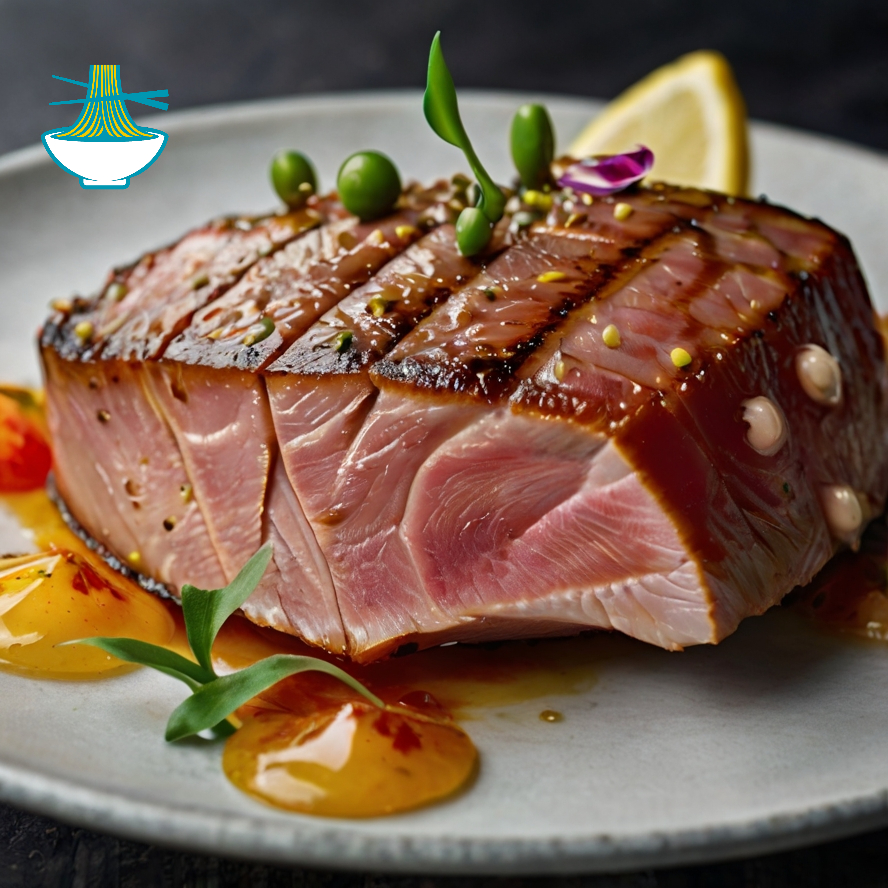Discover the ultimate guide to grilling fresh tuna with this easy-to-follow recipe. Whether you're a seafood lover or just looking to add a healthy and flavorful dish to your menu, this recipe provides step-by-step instructions for grilling tender, juicy tuna. Explore how to enhance its natural flavor with simple marinades and seasoning, perfect for a quick weeknight dinner or a special occasion. 
Ingredients:
- 4 fresh tuna steaks (6-8 oz each)
- 2 tablespoons olive oil
- 2 tablespoons soy sauce
- 1 tablespoon lemon juice
- 2 cloves garlic, minced
- 1 teaspoon dried oregano
- Salt and black pepper to taste
- Lemon wedges for serving (optional)
Instructions:
Prepare the Marinade: In a small bowl, whisk together olive oil, soy sauce, lemon juice, minced garlic, dried oregano, salt, and black pepper.
Marinate the Tuna: Place the tuna steaks in a shallow dish and pour the marinade over them. Cover and refrigerate for at least 30 minutes, allowing the flavors to penetrate the fish.
Preheat the Grill: Preheat your grill to medium-high heat.
Grill the Tuna: Remove the tuna steaks from the marinade and place them on the grill. Cook for about 3-4 minutes per side for medium-rare, or longer if you prefer your tuna cooked through. The internal temperature should reach 145°F (63°C) for well-done.
Serve: Remove the tuna from the grill and let it rest for a few minutes before serving. Garnish with lemon wedges if desired.
Enjoy: Serve your grilled tuna with your favorite side dishes, such as a fresh salad or grilled vegetables.
This grilled fresh tuna recipe is a perfect way to enjoy the rich, natural flavors of tuna while keeping things simple and delicious.
Nutritional Values
Fresh Tuna Steaks (4 steaks, 6-8 oz each)
- Calories: 1,600 kcal (total, for 4 steaks, 400 kcal per steak)
- Protein: 120g (total, 30g per steak)
- Fat: 40g (total, 10g per steak)
- Carbohydrates: 0g
Benefits: Tuna steaks are an excellent source of high-quality protein and omega-3 fatty acids, which are beneficial for heart health. They also provide essential vitamins and minerals, including vitamin D, selenium, and iodine.
Olive Oil (2 tablespoons)
- Calories: 240 kcal
- Fat: 28g
Benefits: Olive oil provides monounsaturated fats, which are good for heart health. It is also rich in antioxidants and vitamin E.
Soy Sauce (2 tablespoons)
- Calories: 20 kcal
- Protein: 2g
- Fat: 0g
- Carbohydrates: 2g
Benefits: Adds flavor and contains small amounts of protein and minerals like sodium.
Lemon Juice (1 tablespoon)
- Calories: 4 kcal
- Protein: 0.1g
- Fat: 0g
- Carbohydrates: 1g
Benefits: High in vitamin C, supports immune function, and adds a tangy flavor.
Garlic (2 cloves, minced)
- Calories: 8 kcal
- Protein: 0.4g
- Fat: 0g
- Carbohydrates: 2g
Benefits: Contains allicin, which has anti-inflammatory and antibacterial properties. May boost immune function.
Dried Oregano (1 teaspoon)
- Calories: 5 kcal
- Protein: 0.2g
- Fat: 0.1g
- Carbohydrates: 1g
Benefits: Contains antioxidants and may have antimicrobial properties. Adds flavor and some vitamins and minerals.
Salt and Black Pepper (to taste)
- Calories: Minimal (negligible)
Benefits: Salt is essential for electrolyte balance, while pepper contains piperine, which aids digestion and enhances nutrient absorption.
Lemon Wedges (for serving, optional)
- Calories: 3 kcal (per wedge)
- Protein: 0.1g
- Fat: 0g
- Carbohydrates: 1g
Benefits: Adds flavor and provides vitamin C.
These values are approximate and can vary based on specific brands and preparation methods.


Comments